Biomedical science
The Biomedical science research at Keele covers 6 key areas:
Vascular Biology
Harper Lab
Current projects
- Using tissue-engineering to create human vessel-on-a-chip models to replicate current arterial thrombosis models. Anticipated impacts: Replacement of animal testing of Anti-thrombotic drug.
- Creating clot-targeted magnetic nanoparticles as an adjuvant to thrombolytic therapies. Anticipated impacts: Improved treatment of patients experiencing stroke, deep vein thrombosis and pulmonary embolism.
- Studying the subcellular structures that control human platelet activation. Anticipated impacts: Identification of novel targets for new anti-platelet drugs to treat those at risk of heart attacks and strokes
Funding

Collaboration

Research outputs
2 Invited book chapters
22 Publications [81% Q1 journals]
- Diabetologia [IF = 10.122, Q1]
- Nano Research [IF = 8.897, Q1]
- British Journal of Pharmacology [IF = 8.739, Q1]
- Cell Calcium [6 publications ; IF = 6.817, Q1]
- Pharmaceutics [IF=6.075, Q1]
- Journal of Thrombosis & Haemostasis [4 publications; IF = 5.824, Q1]
- Journal of Physiology [IF = 5.182, Q1]
- Journal of Biological Chemistry [IF = 5.157, Q1]
- Cellular Signalling [IF = 4.315, Q1]
- FEBS Lett [IF = 4.124, Q1]
- Platelets [IF = 3.862, Q2]
- Tissue Engineering: Part C - Methods [IF = 3.056, Q2]
- Future Science OA [IF = 2.184, Q2]
- Physiological Reports [IF = 2.261, Q2]
Other research outputs from 2021
- 3 PhD students passed viva in last 6 months (2 PI; 1 Co-I). 1 PhD student to complete studies in Jan 2022.
- Current co-chair of the Diversity, Equality and Inclusion (DEI) committee of the International Society for Thrombosis and Haemostasis. Including chairing the DEI panel at the Society’s annual congress on Strategies for encountering bias as an early career professional. The congress had 8000 participants from across the globe. Session to be made available as ongoing online DEI education for all members.
- Treasurer and executive committee member of the Platelet Society (Registered Charity – 1172202)
- Chair of Organising Committee for the Platelet Society main meeting hosted by Keele in March 2021. This attracted 170 delegates from 19 countries, including participants from North America, Asia and Australasia.
Parasitology and Infectious disease
Horrocks Lab
Based in the School of Life Sciences
Supporting development of novel treatments for malaria and other parasitic diseases
- Assay development – supporting preclinical pipeline. Working with GSK, large library screening for potency and rate-of-kill priorities.
- Natural product research. Working with Phytoquest Ltd to explore natural product library action in multiple parasite systems.
- A new approach to vector control. Antimalarial drug delivery in attractive sugar bait traps – Keele, Swiss Tropical Institute and Ifakara Health Institute
Ilaria Russo Lab
Malaria disease in humans: Cellular and Molecular Biology and Pathology of the Plasmodium genus.
Current research
- Last generation mutagenesis and chemical –interference in high-throughput in Plasmodium (in situ, in vitro, ex vivo, in silico
- Innovative phenotypic assays for studying malaria cell biology and pathology
- Immuno-/cellular-responses to P. falciparum pathogenic infection
- Target validation and drug discovery for novel antimalarials Molecular Studies on Plasmodium protein secretion and poly-Asparagine proteins
- Engineering of membrane nanovesicles as innovative malaria vaccination delivering multiple antigens targeting multiple stages of the infection
- Study of the pathogenesis due to Histidine rich protein 2 and 3 Epidemiology and clinical studies of infectious diseases and their related policies in the Katanga region of DRC
- Investigation of Plasmodium virulence factors affecting immune responses and hematologic barriers
Our partners

Cancer Biology
Kwong Lab
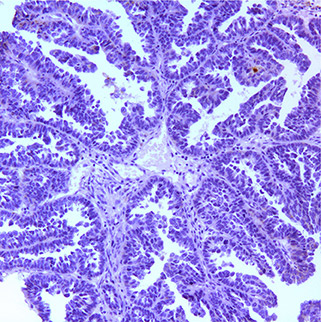 Joseph Kwong’s research focuses on tumour microenvironment (the environment around a tumour) in gynaecological cancers (ovarian cancer and endometrial cancer).
Joseph Kwong’s research focuses on tumour microenvironment (the environment around a tumour) in gynaecological cancers (ovarian cancer and endometrial cancer).
He aims to identify novel signalling pathways between cancer cells and adjacent stromal/immune cells that contribute to tumour progression, and to develop novel strategies for cancer treatment by targeting these tumour-promoting signalling pathways in gynaecologic cancers.
Previous funding records (2016-2022):
- Principal Investigator, “Investigation of MHC class II accessory molecule CD74 in human ovarian cancer” (Mar2022-Feb2024), North Staffordshire Medical Institute (NSMI) Research Awards 2021 (£20,000)
- Co-Investigator (changed from Principal Investigator due to change of institute), “Investigation of tumour-infiltrating regulatory B cells in ovarian cancer with lymphotoxin overexpression” (Jul2020-Jun2023), Health and Medical Research Fund, Food and Health Bureau, Hong Kong, HKD1,468,404 (~£146,840)
- Co-Principal Investigator, “Stromal-epithelial cross-talk signaling in long-term survivors with advanced stage high-grade serous ovarian cancer” (Sep2017-Aug2019), MD Anderson Cancer Center's Sister Institution Network Fund (SINF), USD100,000 (~£72,660)
- Principal Investigator, “Study of PD-L1-mediated tumour immunosuppression that contributes to ovarian cancer recurrence” (Jan2016-Dec2018), General Research Fund, Research Grants Council, Hong Kong, HKD930,825 (~£93,000)
Publications
49 research articles, 1 review, 1 meta-analysis
Citations: 2448 h-index: 30 (Scopus metrics)
Musculoskeletal disease
Kehoe Lab
Rheumatology research
Our research interests are focused on understanding mechanisms of inflammatory arthritis diagnosis, progression and possible treatments including mesenchymal stem cells and mesenchymal stem cell-derived extracellular vesicles.
We also try to find out how stem cells can be “encouraged” to perform better in aging and in disease such as arthritis. We use many approaches, from cell biology, to biochemistry, molecular biology and animal models.
Publications
2 Book Chapters, 31 research papers, 1 paper was selected as a Research Highlight article in Nature Reviews Rheumatology.
Funded by
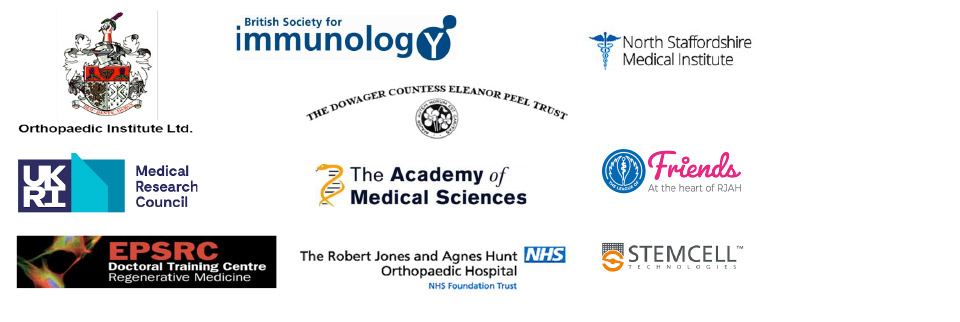
Neurobiology and Neurodegenerative disease
Bowerman Lab
The central thematic of our research programme is to identify novel pathological pathways that contribute to the pathophysiology of neuromuscular and skeletal dysplasia conditions and to investigate novel therapeutic approaches using a combination of omics, bioinformatics and drug repurposing strategies.
Current and past research (2015-2021; totalling £1.9M) funded by:
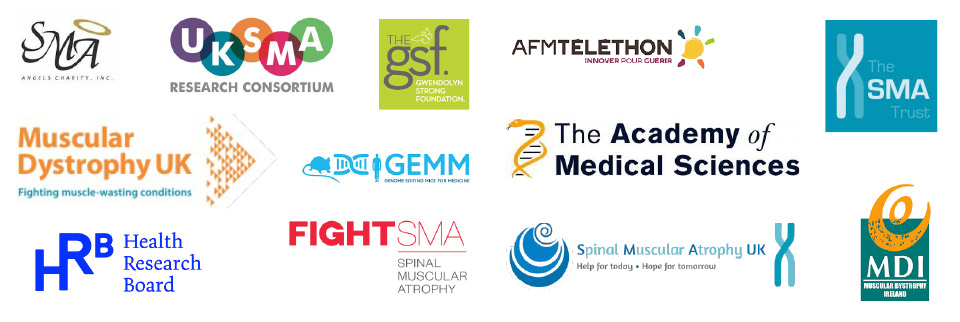
Publications
1 Book chapter, 25 research articles, 8 reviews, 2 editorials, 3 patents
Citations: 1569 h index: 18 i10 index: 20
Guimond Lab
Our lab studies the interactions of carbohydrates with proteins. We take advantage of the natural ability of heparin to regulate many proteins involved in diverse biological processes. By synthesizing heparin analogs, we can target specific cellular processes and reduce off-target effects, thereby creating potential therapeutics with improved pharmacological properties.
Our techniques:
- Chemistry (Chemoenzymatic synthesis)
- Structural biology (NMR, CD, FTIR)
- Cell biology (Cell signalling and cell fate)
- Molecular biology (Protein production, RNAi, CRISPR)
Current and past research funded by:
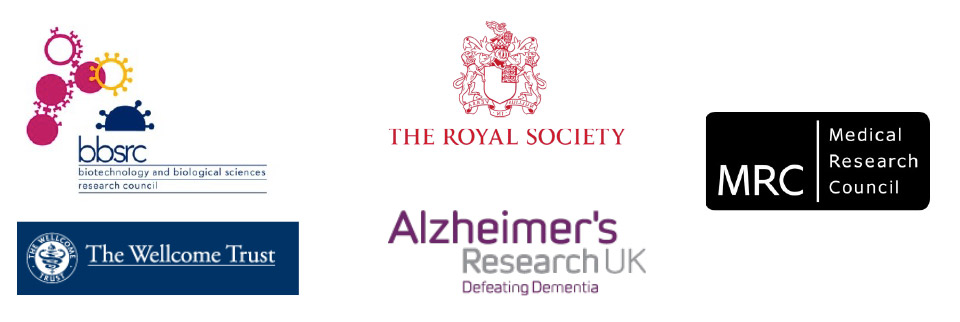
Publications
3 Book Chapters, 51 research articles, 6 reviews, 1 editorials, 2 patents
Citations: 4938 h index: 21 i10 index: 40
Gates Lab
The Gates’ laboratory supports projects for both undergraduates and postgraduates, with time spent in the lab ranging from a couple of months to three-year PhD studentships and fully-funded postdoctoral research. The laboratory’s research is focused on understanding how connections in the brain and spinal cord form during development, so that this information can be used to re-form connections that can be damaged or degenerate in the mature nervous system. The lab has a cell-based approach to its research; using cultures of neural cells to discover how they form “wires” initially and how these wires can be regenerated if they are damaged. The laboratory seeks to apply their findings to treating injuries to the nervous system (such as spinal cord injury) or even replacing connections that are lost in common neurodegenerative disease (such as Parkinson’s). Throughout his time at Keele; Monte has obtained research funding of ~£4M (~£1.5M to Keele) from organisations such as the BBSRC, Horizon 2020 program, Parkinson’s UK, and The Henry Smith Trust.
Chari Lab
Neural Tissue Engineering Keele
Research interests:
- Stem cell sprays for neurological injuries.
- Development of electroactive hybrid materials for neural repair.
- Use of novel biomedical engineering strategies such as magnetic nanoparticles, implantable hydrogels and neural cell seeded polymer scaffolds to promote neural regeneration.
- Development of in vitro neural injury models to reduce reliance on live animal experiments.
- Investigation into the molecular effects of immunotherapies on neural development.
Funded by
Publications
- Woods WA, Evans DE, Barcons A, Tzerakis N, Adams C, Chari DM. 2021. Stem Cell Sprays for Neurological Injuries: A Perspective. Invited article for Emerging Topics in Life Sciences. In press.
- Basit RH, Tzerakis N, Jenkins S, Chari DM. 2021. In vitro penetrating traumatic brain injury model to screen surgical biomaterials for regenerative applications. Materials Science and Engineering C. In Press IF=7.32
- Woods WA, Choudhary F, Tzerakis N, Adams C, Chari DM. 2021. Developing A New Strategy for Delivery of Neural Transplant Populations using Precursor Cell Sprays and Specialised Cell Media. Advanced Nanobiomed Res. In press.
- Prager, J., Ito, D., Carwardine, D. R., Jiju, P., Chari, D. M., Granger, N., & Wong, L. F. 2021. Delivery of chondroitinase by canine mucosal olfactory ensheathing cells alongside rehabilitation enhances recovery after spinal cord injury. Experimental Neurology, 340, 113660. IF=4.56
- Mogas Barcons, A., Chari, D. M., & Adams, C. F. (2021). Enhancing the regenerative potential of stem cell-laden, clinical-grade implants through laminin engineering. Mater Sci Eng C Mater Biol Appl, 123, 111931. IF=7.32
- Prager J, Adams C, Delaney A, Chanoit G, Tarlton J, Wong LF, Chari DM, Granger N. 2020. Stiffness- matched biomaterial implants for cell delivery: clinical, intraoperative ultrasound elastography provides a ‘target’ stiffness for hydrogel synthesis in spinal cord injury. Journal of Tissue Engineering. IF=7.8
- You HH & Chari DM. How can nanoparticles improve neural cell transplantation therapy? 2020. Invited editorial for Nanomedicine London, In Press. IF=4.9
- Finch, L, Harris S, Sen J. Solomou, G Adams CF, Tzerakis N, Hart SR, Chari DM. Safe nanoengineering and incorporation of transplant populations in a neurosurgical grade biomaterial, DuraGen PlusTM for protected cell therapy applications. Journal of Controlled Release. 2020. 10;321:553-563, IF=8.37
Jenkins Lab
Neural co-cultures & injury models. Neuroimmune responses to biomaterials.
Publications
- Basit, Tzerakis, Jenkins, Chari. In vitro model of traumatic brain injury to screen neuro-regenerative biomaterials. Mat Sci Eng C (2021) 112253.
- Singh A, Chow O, Jenkins SI et al. Characterizing ischaemic tolerance in rat pheochromocytoma (PC12) cells and primary rat neurons. Neuroscience (2021) 453:17-31.
- Patanbendige, Singh, Jenkins, Sen, Chen. Astrocyte activation in neurovascular damage and repair following ischaemic stroke. IJMS (2021) 22:4280.
- Rawlinson C, Jenkins SI, Thei L, Dallas ML, Chen R. Post-ischaemic immunological response in the brain: targeting microglia in ischaemic stroke therapy. Brain Sciences (2020) 10:3.
- Mira A, Sainz-Urruela C, Codina H, Jenkins SI, Rodriguez-Diaz JC, Mallavia R, Falco A. Physico-chemically distinct nanomaterials synthesized from derivates of a poly(anhydride) diversify the spectrum of loadable antibiotics. Nanomaterials (Basel) (2020) 10(3):486.
- Adams CF*, Jenkins SI*. Nanoengineering neural cells for regenerative medicine. Invited book chapter: 21st Century Nanoscience – A Handbook (2019) pp17, CRC Press.
- Subramanian M, Miaskowski A, Jenkins SI, Lim J, Dobson J. Remote manipulation of magnetic nanoparticles using magnetic field gradient to promote cancer cell death. Applied Physics A (2019) 125:226
- Fricker RA, Green EL, Jenkins SI, Griffin SM. The influence of vitamin B3 on neuronal health and disease. Int J Tryptophan Res (2018) 21;11:1178646918776658.
- Jenkins SI, Chari DM. A stoichiometrically-defined neural co-culture model to screen nanoparticles for neurological applications. Invited book chapter: Neuromethods: Nanoparticles in Neuroscience. (2018) pp.229-250, Humana Press, New York, NY.
Meet the team
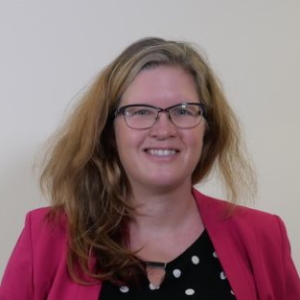
Dr Melissa Bowerman
Senior Lecturer in Neuromuscular and Skeletal Disorders
- Hux168
- +44 1782 7 33058
- m.bowerman@keele.ac.uk

Dr Oksana Kehoe
Senior Lecturer in Biosciences
- DJW1.03
- +44 1782 7 34738
- o.kehoe@keele.ac.uk

Dr Joseph Kwong
Lecturer In Bioscience
- DJW1.03
- +44 1782 7 33930
- j.kwong@keele.ac.uk

Dr Scott Guimond
Lecturer (E&R) Biosciences
- HUX2.26
- +44 1782 7 34663
- s.e.guimond@keele.ac.uk

Dr Alan Harper
Senior lecturer in Physiology
- Teaching - David Weatherall Research - Guy Hilton Laboratories
- +44 (0)1782 734654
- a.g.s.harper@keele.ac.uk

Professor Divya Maitreyi Chari
Professor of Neural Tissue Engineering
- Huxley Building : 225
- +44 (0)1782 733314
- d.chari@keele.ac.uk

Dr Monte Gates
Senior Lecturer in Medicine & Neuroscience
- Huxley Building : 227
- +44 (0)1782 733875
- m.a.gates@keele.ac.uk

Professor Paul Horrocks
Professor of Molecular Parasitology
- Huxley Building 226
- p.d.horrocks@keele.ac.uk

Dr Stuart Jenkins
Lecturer in Neuroscience
- Huxley Building : 225
- +44 (0)1782 733654
- s.i.jenkins@keele.ac.uk

Dr Ilaria Russo
Lecturer in Bioscience
- Huxley Building 301
- i.russo@keele.ac.uk

